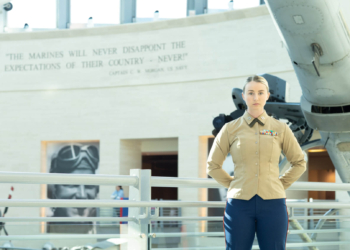“The incoming CO is geo-baching — you will be the lead spouse after the change of command.” That’s when it really hit home and became real. Up until this point, I’d been like most military spouses, simply adapting to the constant changes of military life as we moved around and my spouse’s career progressed. I’d never thought about the likelihood of running the spouses club and now that reality was only a few short months away. I panicked!
Over the past 12+ years, I had diminishing involvement with the spouse clubs. Plus, I was a guy and had pretty much always been the only guy — now I was expected to show up to lead a group of roughly 30 women … ALONE.
Months passed while we moved from one side of the country to the other, and the change of command ceremony was looming. I met with the current CO’s wife and got a “turnover” over coffee. Luckily, their next set of orders didn’t have them PCS’ing, so she would be around if I had any questions. I was full of doubts and terrified. “I’ve been away from the spouse clubs for too long. I don’t know how they operate.” “Will they take me … a guy … seriously as a leader?” I started wishing I could have accompanied my wife to Command Leadership School. But with completing the house remodeling projects, one kid in school, a toddler, a dog, a 2600-mile drive towing a car, as well as everything else required during a move, there simply was not enough time.

What do you even call the husband of a female CO? You can’t call them COW (CO’s Wife) because it just doesn’t work; COP (CO’s Partner) and COS (CO’s Spouse) seem to be the most common acronyms for this uncommon occurrence. I never had a choice in the matter, anyhow. My acronym was given to me before we ever PCS’ed. A helo pilot in the squadron we were headed to said I would be the “King of the Wives.”
It stuck, and I became known as the KOW. I was hesitant at first people — would they think I had self-proclaimed myself “The King?” However, the other spouses loved the title. Even those from other squadrons — and their husbands — started calling me “The King of the Wives,” so I accepted the title with honor.
TERRIFIED. That’s the only way to describe how I felt about that first OSC meeting. Standing up in front of 10-15 women I didn’t know and attempting to lead the group for the next 3 years, was terrifying
A few spouses, the kindest of souls, sensing my sheer terror and fear took pity and helped me through that meeting. Thus, began my journey of leading the OSC. It slowly got easier and I found my confidence and rhythm. What I finally realized was that I needed let go of my preconceived notions of what a lead spouse/KOW should be, and adapt my personality and experiences to this position.
In the past, I’d extricated myself from the OSC because of drama, so I tried to eliminate as much drama as I could. I asked for input on ways to improve the group. What did people like? What didn’t they like? Did they prefer meetings during the week or weekends, days or night, kids or no kids? To me, if you were hosting a meeting, as long as I was available, I was open to pretty much anything. Because of this, we had a Sunday brunch meeting, game meetings (Pictionary, catch phrase, two lies and a truth, etc.), we even rented the base rock-climbing wall.
I made myself approachable and disseminated as much information as I could. I was contacted many times by spouses for help. I went into housing to inquire about concerns. I asked questions in base meetings regarding health care. If I didn’t know something, I would find someone who did know the answer and then relay it to the spouses. Sometimes there was nothing I could do, but the fact that I took the matter seriously was what counted.
It was an emotional rollercoaster full of ups and downs. From being terrified and full of dread, to looking back now with fond memories of the experiences and lifelong friends gained. It was a hell of a ride and I’m glad I was given a ticket. Could I have done things differently? Certainly! You can always look back and second-guess yourself. I simply did the best I could, treated people the way I would like to be treated, and that seemed to work well. In the end, I don’t think my gender made much difference. My attitude and actions were what really mattered.
Read comments







































